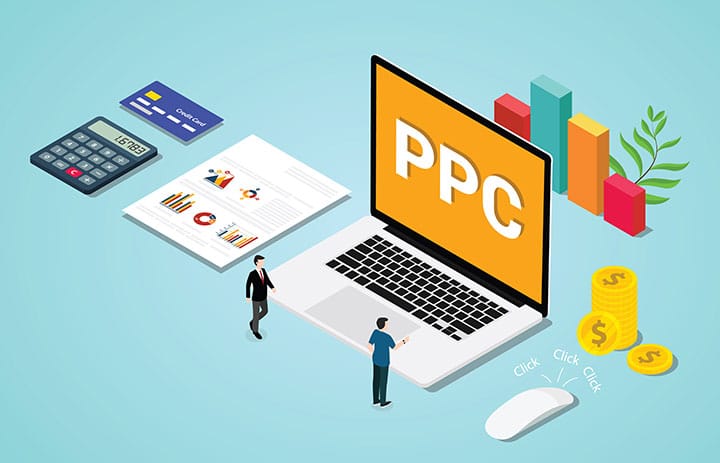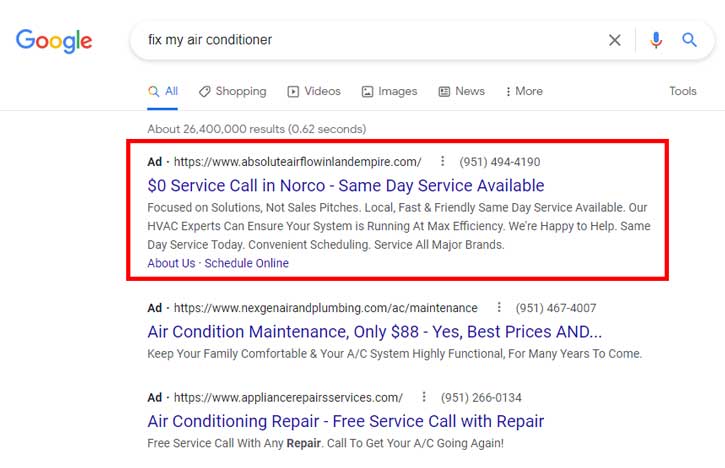Share This
How Google PPC Search Ads Work

Google Search is the world’s most-used search engine. As such, it is a popular destination for marketers and business leaders to advertise their products and services. Google allows them opportunities to place their ads in front of the platform’s users. If you are looking to advertise on Google, then you must understand how Google PPC search ads work so you save time and money crafting the most effective ad copy.
What is Google Ads?
Google Ads operates as a Pay-Per-Click (PPC) model where users bid for ad placement. The service lets marketing teams and business owners promote their products and services via online ads. Users manage their ad campaigns online whenever they want. They can create and modify each campaign’s text and settings. They can also change each campaign’s budget and where ads appear.

Defining Pay-Per-Click
PPC is a type of digital advertising where users (marketers, business owners, etc.) pay an online platform each time someone clicks on their ad. For example, if someone clicks on your Google Ad, then you must pay Google a prearranged price for that click.
If you pay for a click, then that click has a cost. This figure is the Cost-Per-Click (CPC). You can use this metric to edit your ad campaigns, make new, more effective ones, and ensure you stay within budget. You can calculate your ad’s CPC by dividing the cost of the clicks by the number of clicks. For example, if your ad gets 2 clicks at $.10 per click, then each click costs $.05.
PPC advertising can help cost-effectively increase your brand’s visibility. However, you must know how to best optimize your ads and spend time doing so. CPC averages vary among platforms and industries.
If you use Google Ads, then you will bid on where your ads place in Google Search results. The bid is what you agree to pay Google for each click of your ad. You will not simply be bidding on an ad but instead on keywords that will attract interested Search users.

Types of Keywords You Can Bid On
Exact Match
This type of keyword match results in your ad being shown to someone looking for the exact phrase you have specified. Google will show your ad on exact keyword matches and other searches that have the same meaning. For instance, if someone searches for a walking stick by entering “stick for walking” into Google, the intent is the same for both phrases. If your ad contains the keyword “walking stick,” then it should show up in the search results.
Exact match keyword ads can reach your targeted audience but could yield fewer results than phrase and broad matches. However, you typically will not need to create long lists of keywords to reach your audience.
Phrase Match
A phrase match can result in your ad being displayed on searches that contain the meaning of the keyword phrase. You are basically adding words to an exact match keyword. For instance, if your ad contains the phrase match “shipping services Miami to Denver,” then your ad can appear to people who search for “fast shipping services Miami to Denver” or “Miami to Denver shipping.” The intent is the same as the keyword phrase.
However, if a search changes the meaning of the phrase, then the ad will not appear in the results. Rearranging the word order can change the meaning. “Denver to Miami shipping services” changes the example’s intent, rendering the ad useless in this case.
Broad Match
This type of keyword can place your ad in searches that are related to your ad’s keywords. Your ad can reach more people without creating a lengthy keyword list. “Shipping services Miami to Denver” can place your ad at the top of searches for “Miami shipping,” “Miami delivery company,” and more. Search results might not even contain any of your ad’s keywords.

Auction Bidding with a Twist
Since Google Search is the world’s most-used search engine, businesses must compete with one another to advertise on the platform. They must bid against each other to show their ads. However, the highest bid does not always win.
Google wants to give its users the best content. If it does not, then users might use another platform for whatever they need. This line of thinking extends to advertising. Businesses must compete against one another in auctions as well as attain an acceptable Quality Score.
Quality Score
Google’s Quality Score influences which ads will appear in search results, how frequently, and where they will rank. Additionally, the Quality Score dictates how much businesses pay for each ad click.
The Quality Score is based on the ad’s chances of being clicked, its relevance to searches, and how well your landing page (the web page where people go when they click an ad), engages people who click the ad. Quality Scores are determined by historical data comparisons of similar keywords.
Although Quality Scores are not meant to factor into your ads’ performance metrics, you can modify your campaigns to achieve a higher score and possibly an auction victory.
3 Ways to Improve Your Ad’s Quality Score
1. Choose relevant and succinct keywords
If your company sells walking sticks, then your ad should contain keywords that match the meaning behind an associated search query. Using the word “stick” as a keyword is too generic. You should stay away from simple keywords. “Wooden walking stick” is a better option.
2. Use specific keywords when necessary
For example, if you want your ads to reach your company’s service area, then include relevant locations in your ad copy. For example, if you operate a plumbing company in Baltimore, then you should use a keyword like “Baltimore plumbing company” instead of simply “plumbing company.”
3. Create a great landing page
If someone clicks on your ad, then they are probably interested in what your company offers them. Therefore, your landing page must fulfill their expectations. It should have more details about your product or service and a strong call to action to purchase it. Landing pages should also be quick-loading and as simple as possible. You do not want to confuse the potential customer, especially at this stage. You want them to click on the purchase link or to schedule a demo. When Google picks up on how effective your landing page is, it might raise your ad’s Quality Score.

Clicking Toward Success
Google Ads lets you advertise on their platform. You can bid on specific keywords contained within your ad. If your bid and ad’s Quality Score are high enough, then your ad should appear at the top of Google’s search results. The trick is to optimize your keywords and landing page to improve your ad’s chances of success. It takes money to make money. Knowing how to manage Google PPC search ads can help minimize what you spend and maximize your brand’s potential reach.